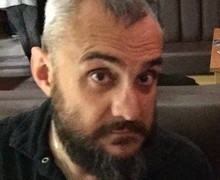Interview with Liam Proven
Generation gaps

Liam Proven will give a talk about Generation gaps at FOSDEM 2020.
Q: Could you briefly introduce yourself?
I’ve been in IT for just over 30 years, moving from tech support to consultancy to technical journalism. These days, I work as a technical writer for SUSE in Prague, where I live with partner and daughter.
Q: What will your talk be about, exactly? Why this topic?
I’ve been watching the computer industry develop since fairly early in the 8-bit era, long enough ago that the first two computers I ever used supported neither sound nor graphics. I’ve watched about 3 big technological shifts, then a long gap. I think another one is about to happen, and it will be the biggest in about 40 years.
Q: What’s this new shift and what’s so important about it?
This is a shift from multi-level storage (RAM and disks) to single-level storage (NVDIMMs).
This is starting to come onto the market now, and it enables an entirely different model of OS design which renders all existing operating systems, FOSS and proprietary, obsolete.
If you don’t have secondary storage, if your primary storage is nonvolatile — it’s all just RAM.
You don’t need to boot, or to shutdown. You don’t need files. You don’t need file types, binaries, text etc.
You don’t need a filesystem.
No filesystem, no files means no more Unix. Remember “everything is a file”? No files, no *nix.
But nobody has noticed yet.
Q: What do you hope to accomplish by giving this talk? What do you expect?
There aren’t many people left in the industry today who remember what such shifts are like, but I do. I hope to prepare the way a tiny bit, because it’s the last big opportunity we’re going to get.
Q: Your talk has a quite broad topic, about the whole computer industry and our model of computing. What do you consider the biggest changes in computing over the last 20 years?
That is precisely the problem. There haven’t been any truly disruptive changes in that time. The last big ones were over 25 years ago, and as a community, we’ve forgotten what it’s like.
Q: 2020 marks the 20th anniversary of (F)OSDEM. What contributions has FOSDEM made to the advancement of FOSS, or how did you in particular benefit from FOSDEM?
This will be my third FOSDEM, and personally it’s been valuable to me not only in what I’ve learned from it, and about the impressive breadth of the FOSS community, but also the people I’ve met.
Q: Have you enjoyed previous FOSDEM editions?
Hugely. It’s consistently one of the best IT conferences I’ve ever been to.

Creative Commons License
This interview is licensed under a Creative Commons Attribution 2.0 Belgium License.